93rd Academy Awards: Black-and-White edition
 Wednesday, April 28, 2021 at 12:01AM
Wednesday, April 28, 2021 at 12:01AM 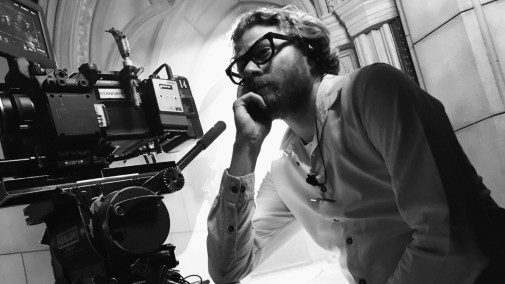
Despite some semi-shocking results in the major categories, this year's Oscars were relatively surprise-free. Sure, the Best Original Song choice was unexpected, but there are very few precursors for that particular category, leaving it always a bit up in the air. Only one "below the line" or "technical" category managed to shock me. That was the Cinematography race. While David Fincher's Mank had nabbed the ASC prize, I assumed Nomadland would get an easy win on Oscar night. After all, it swept the critics' prizes, won the BAFTA the production went into the ceremony as the Best Picture frontrunner. Nomadland even won that last one. Nevertheless, Joshua James Richards' poetic landscapes were ignored in favor of Erik Messerschmidt's silvery monochrome for Mank...
The conclusion to this specific race is even crazier when one considers that the Fincher flick was Messerschmidt's first feature. That being said, Mank's in black-and-white, making it part of a trend to (over?)reward grayscale cinema at the Oscars. If you want to win a Cinematography Oscar, don't forget to drain the color out of your picture. Would Nomadland have won if it had been shot in black-and-white? Last year, I explored how AMPAS has been infatuated with monochrome cinematography, going so far as to nominate such a hostile, complicated art film as The Lighthouse. Furthermore, because Parasite was re-released in black-and-white, I also made a photo collection examining how each Best Picture nominee would look in glorious black-and-white. Inspired by those past write-ups, here's a collection of screenshots from the other Best Picture nominees, four of which were defeated by Mank in this category...
JUDAS AND THE BLACK MESSIAH
Cinematography by Sean Bobbitt
NEWS OF THE WORLD
Cinematography by Dariusz Wolski
NOMADLAND
Cinematography by Joshua James Richards
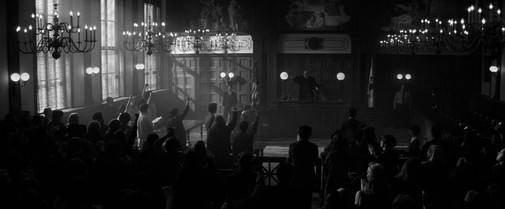
THE TRIAL OF THE CHICAGO 7
Cinematography by Phedon Papamichael
It's fascinating to examine how crucial color is to Nomadland's aesthetic, its warm landscapes and chilly skies, how The Trial of the Chicago 7 gains potency in monochrome, how News of the World needs the yellow blare of the sun. Because I love taking screenshots, I went a step further than these black-and-white samples of the Cinematography nominees. What would the remaining Best Picture contenders look like in black-and-white? If one of them had made that creative jump, maybe we could have had a radically different race. Who knows? In any case, here's a sampling of the Oscar class of 2020 in black-and-white_
THE FATHER
Cinematography by Ben Smithard
MINARI
Cinematography by Lachlan Milne
PROMISING YOUNG WOMAN
Cinematography by Benjamin Kracun
SOUND OF METAL
Cinematography by Daniel Bouquet
Do you think any of these films would have been better in black-and-white?



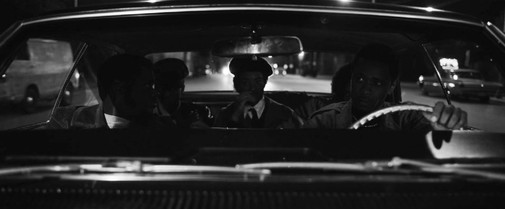
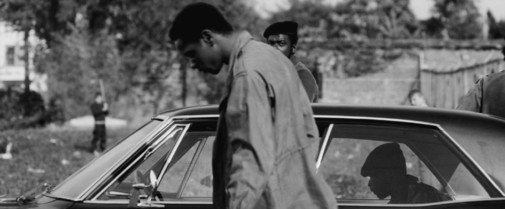
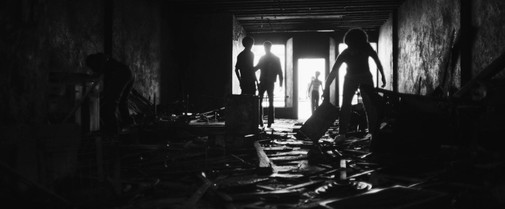
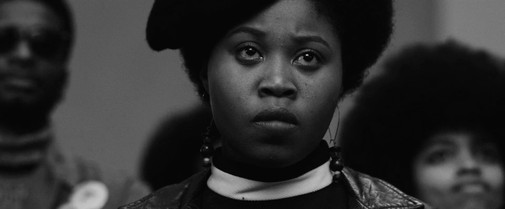
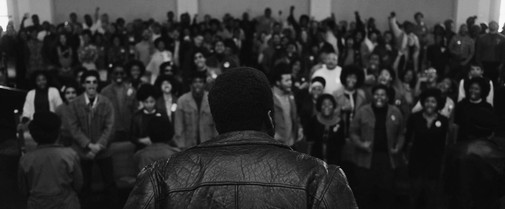
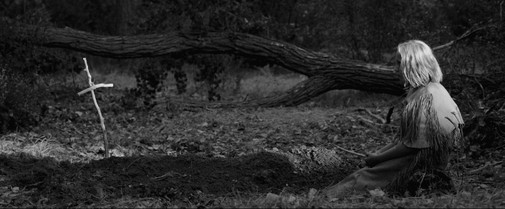
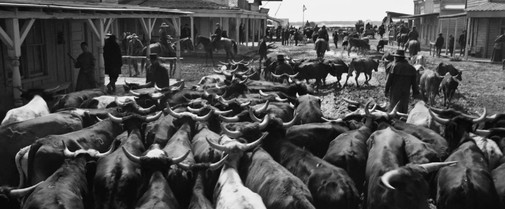
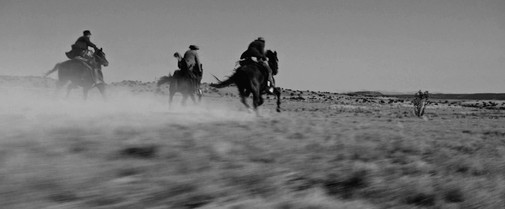
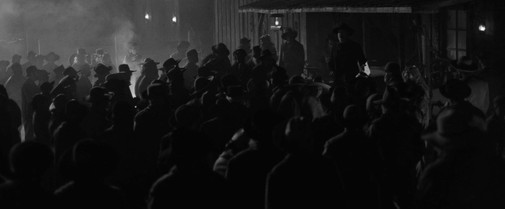
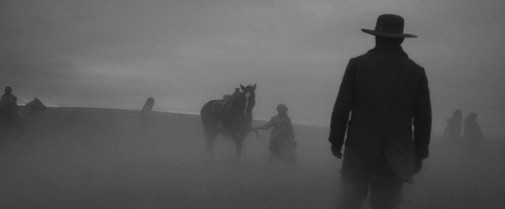
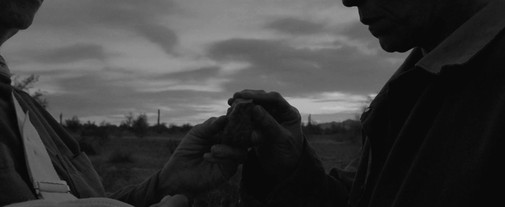
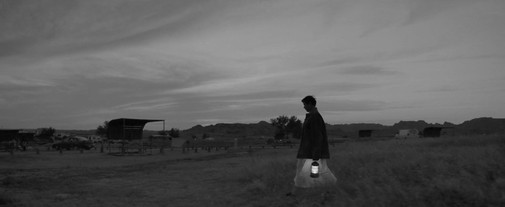
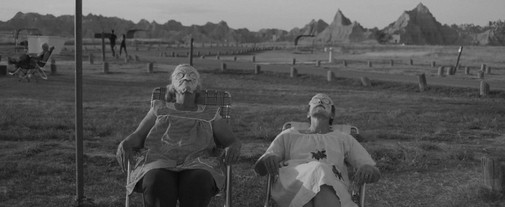
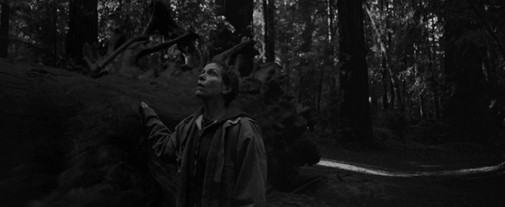
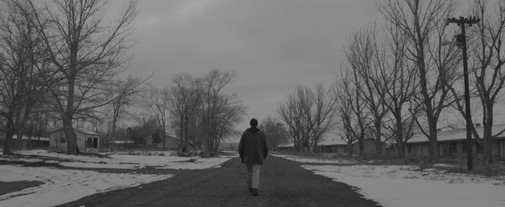
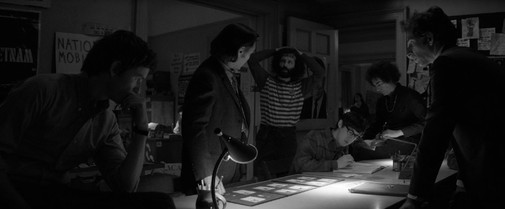
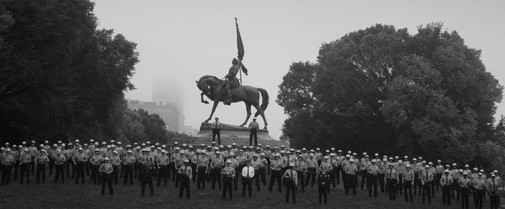
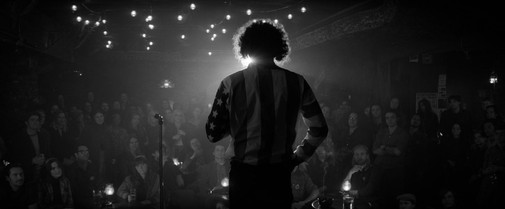
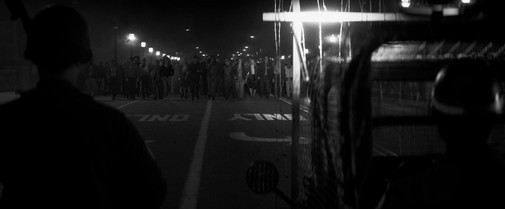
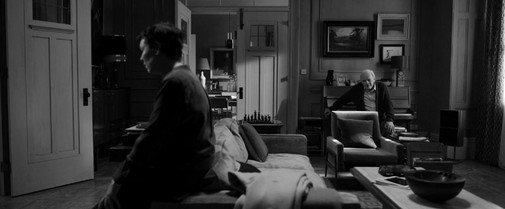
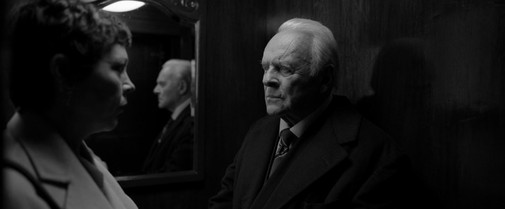
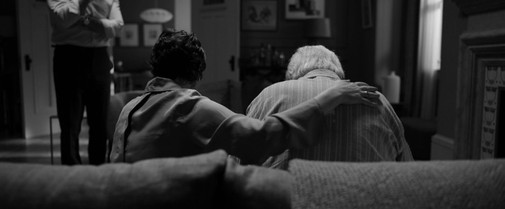
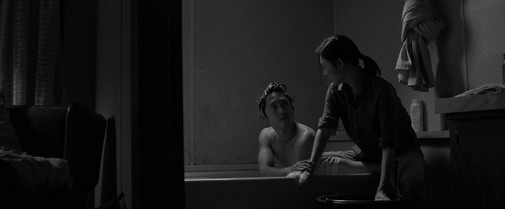
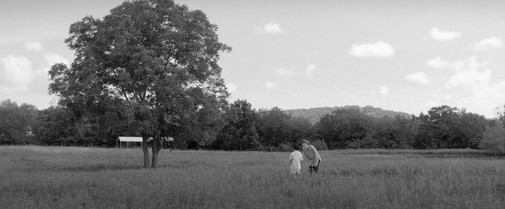
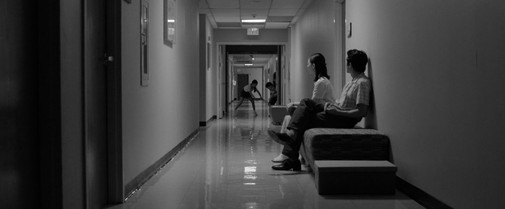
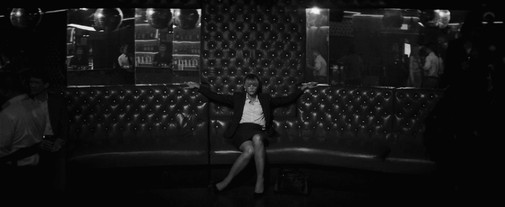
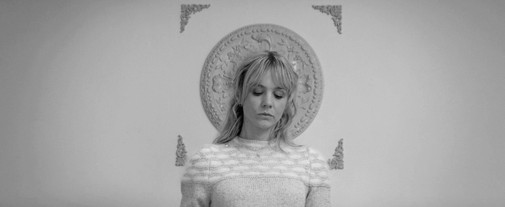
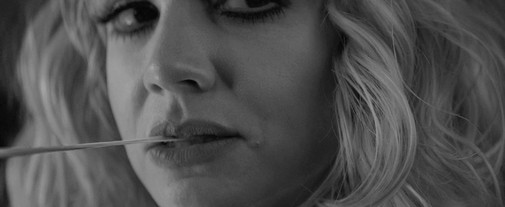
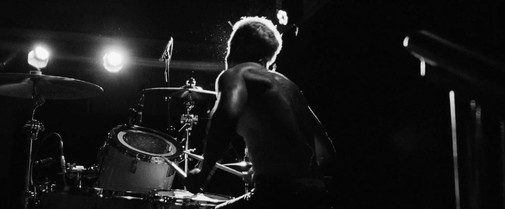
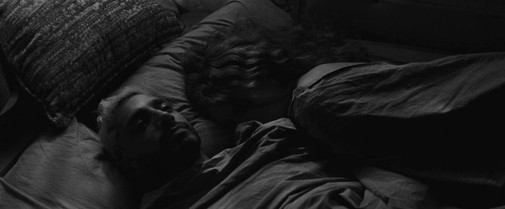
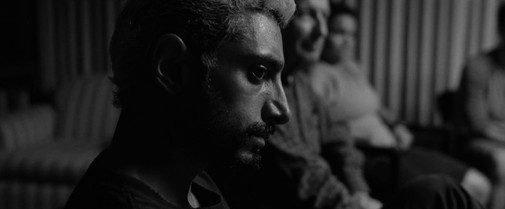
Reader Comments (24)
Sound of Metal, The Father and News of the World would have been good candidates for black-and-white. Judas and the Black Messiah and Promising Young Woman (both as seen above) would have been ruined by desaturation. Minari, Nomadland and Chicago 7 wouldn't gain much. And as we recently saw from production stills, Mank might have been even better in color (and would probably have been a stronger contender in costume design, makeup and supporting actress).
Interesting. I think News of the World would’ve been fine in B & White, and both Trial and Judas gain particular potency based on these stills. It’s clear Nomadland and Promising Young Woman eeded to be in color, and I think The Father would’ve suffered in its depictions of the shape-shifting living space without the oft-subtle color shifts. Also, this adds fuel to the “black and white gimmick win” fire that Mank clearly benefitted from.
"If you want to win a Cinematography Oscar, don't forget to drain the color out of your picture."
LOL. Only three black-and-white movies have won in the last 54 years so what are you talking about? :)
Some quick math, Someone:
Since 2009 (the year it could be argued this semi-recent semi-trend began), there have been approximately 8,500 full-length movies released in the US, depending where you look. Approximately 80 of those were in black and white. There have been 60 cinematography nominees in that time frame, 7 of which were in black and white. 2 of the 7 won.
So, we have 12 percent of the nominees and 17 percent of the winners coming from 1 percent of the movie pool. I think that’s more than just a fluke correlation, and is what Claudio is referring to. There’s a certain prestige that seems to be automatically bestowed upon many black and white films (in modern times) simply for their existence.
Cláudio, dear, I love you SO MUCH, but this article is probably your worst. I presume you know that a BW cinematography is much more than just removing colors. So, please, don’t act like a millennial pedant, even if it was just for fun.
Absolutely not.
This award was a joke and now I demand retroactive Oscars for White Ribbon, Ida and Cold War.
Huh. I think Judas looks good this way. The Father in black-and-white would've been terribly sad.
One of the best Oscars for cinematography in recent memory so Academy chose right.
They had good year. "Another Round" and Kaluuya are laughable choices but apart from that everything was pretty cool.
Wow, NEWS OF THE WORLD would've looked far better in black and white!
Maybe Sound of Metal could have worked in Black and White - or at least some of the club scenes that you selected. But, the color in the Europe scenes - especially on the street - have so much power as they contrast what's happening with sound.
Minari, Nomadland, and Judas would have been ruined without color.
I think the academy has a clear bias for B&W film in the same way they do for bio-pic performances. It just communicates something about the quality/difficult/artistry that wins them over and helps to jumpstart a campaign. While a cinematography upset will never be a huge deal, this felt like one of the biggest upsets of the night - I actually though it meant that Nomadland was in trouble!
Also, Promisng Young Woman loses its raison d'être. It might as well be a novel or podcast if it's going to be in Black and White.
Interesting that even though Nomadland is in some ways kind of a Western, it really doesn’t lend itself nearly as well to B&W as News of the World. Maybe it’s a modern vs. classic Western thing? B&W makes NotW look even more old school than it already does, which is not a bad thing aesthetically. Similarly, I wonder if Judas and Trial benefit from being historical movies, which we tend to associate more naturally with B&W images.
Color is *absolutely*crucial to Promising Young Woman and The Father, for the reasons Teppo2 points out.
And removing color also tends to drain a lot of the warmth out of Minari. The green in particular is really important to that film,
Early in the 2010s, computer-enhanced cinematography was all the rage, with Inception, Hugo, Life of Pi, Gravity, and Birdman all winning the Oscar. Now it's black-and-white. I hope this trend fades, too. Nomadland was really robbed... it would have been so much less with a lesser cinematographer.
Call me stupid but I couldn't see a thing of what was going on in Mank.
The faces in "Judas and the Black Messiah"' would have been totally obscured! Thought experiment OVER!
Loved the upset Cinematography Oscar win for "Mank."
I was pretty upset when Mank won Best Cinematography as I thought it was the worst of the year (that I've seen). Just muddy, undifferentiated mush. So much outstanding work (by everyone else) was ruined in my opinion, and I have no problem with black and white when done well. This wasn't it.
I would have given it to Nomadland, but really, just anything else would have been better.
Well done. I don't think Nomadland can be done in black and white because the US Southwest is so rich with color, but Trial of Chicago 7 and News of the World are great. Promising Young Woman seem interesting
I did not love Mank's cinematography. Cold War and Ida were outstanding black and white examples.
Tree of Life lost to Hugo so in the back of my mind, I feared Nomadland would lose. Natural light pastoral scenes lose to high production design with cinematography.
Well, Someone is right. Only three B&W films have WON in the last 54 years. We're not talking about nominations. Statistically that is not a good rate. Color films still win far more often.
MANK was only a slight surprise considering it did take the ASC after all.
I don't want to imagine a world where Promising Young Woman isn't in color.
I found the lighting for Mank to be more distracting than useful. Too often the light shining in a window was drawing attention from the story/character interaction. It felt intrusive. Notice my fancy lighting! One interesting thing: the drawing room scene supposedly at Hearst Castle -- to the extent you could see it, I thought they might have actually filmed it there. I've never been to the Huntington Library, but it was a good choice. And the rooms are dark at Hearst Castle, but the lighting just made it disappointing. I would have voted for Judas.
2021 B&W contenders
The Tragedy of Macbeth
Passing
The French Dispatch is half-B&W, half-color, so Robert Yeoman is a good bet for a nom next year.
Antônio -- Sorry you didn't like this piece. I've written before about the difficulties of making black-and-white films, specifically the challenges of designing costumes for such a production. It's obviously not just taking the color out and I hope I didn't imply that with this piece. It was mostly a fun thing to create, write, and examine. By taking the color out of these film stills, we can better understand the role color has in these specific films. At least, that was my experience.
I'll try to do better in the future.